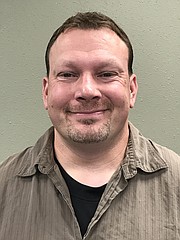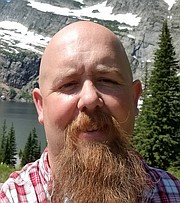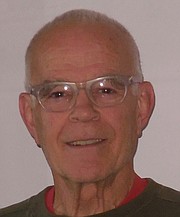No headline
In anticipation of Election Day, The Western News posed seven questions to the four candidates for the three open seats on the City Council. Three candidates — Kristin Smith, Gary Armstrong and Gary Beach — are current council members. The fourth, Arlen Magill, sits on the Police Commission. The questions and their answers, lightly edited for style and spelling, are published below.
(Editor’s note: Two other candidates for city office — Brent Teske for Mayor and Angel Ford for City Council — were elected by acclamation Sept. 5 after no one ran in opposition. Teske had run for reelection, while Ford, appointed to the City Council May 30 to replace Allen Olsen, who retired April 27, had run for her first full term.)
Please describe your public service experience.
Gary Armstrong: My public service experience, practically speaking, is all of six months long; that being the length of my current appointed position as Libby City Councilman. However, this is not the first time I have had experience in serving the public. Between 2008 and 2010 I was enrolled in, and graduated with honors from, a Paralegal Studies program. In order to complete the Internship requirement I volunteered, first, at a non-profit legal help center, assisting staff attorneys and clients. And then the second volunteer internship was a research position in the Clerk’s department of a Washington State Superior Court, tracking old court records of Guardianships. In that position I was also given free-reign to attend any court sessions I chose, sitting with the clerk/recorder in the courtroom. I also accompanied Clerks on their rounds, interviewing new prisoners in jail in advance of first appearances in court.
Gary Beach: Being the youngest member on the currently seated City Council my public service experience is limited compared to some of the other candidates this is partially due to previous occupations. However the experience gained will benefit me in working for the people as a City Council Member. Having worked many years in managerial roles and construction, I have a good understanding on how to prioritize items and keep things flowing.
Arlen Magill: Since to Libby I have been fortunate enough to work for and volunteer with several nonprofit organizations, including: The Libby Senior Center, The Heritage Museum, Assembly of God Church, and Libby Christian Church. In addition is my appointment to the Libby Police Commission.
Kristin Smith: I have worked as a public employee at different times in my adult life from libraries (U of M), to land management agencies (BLM, Reclamation), to local government (Lincoln County, Libby, Sidney, State of Montana). Intermixed with those experiences has been work in the private sector as a planning consultant and business owner.
What motivates you to serve the public?
Armstrong: My motivation to serve the public has evolved from “I could do better”, to “how does that all work”, to “put up or shut up”. One of the most despised positions (public service at the city level) by some is also one of the most important civic jobs. The city council writes the rules that establish the nature and tone of our community. I am of an age that remembers peaceful resolution, agreeing to disagree, and then coming to a consensus decision.
Beach: The reason I ran the first time still remains the same, as I watched how things were going I decided that there are two choices I could sit on the side lines and talk or actually get involved and try to help the situation. Having spent a year on the council now I feel that I have learned a lot about the workings of the City as well as demonstrated my character to the public.
Magill: I have always tried to give back and help folks when possible. I feel that I owe the Libby Community so much because: Libby is where I met my wife Angela, Libby is where we were married, Libby is where both our children Isaac and Bethany were born. Simply put the very best things that have happened in my life have happened to me here in Libby.
Smith: Decisions made by public agencies affect our daily lives even though we may not realize it. Businesses can come and go and while some of them can be transformative in how we interact with each other, public institutions are generally permanent. It’s through public service that there can be great potential to positively impact peoples’ lives. It takes patience and tolerance and transparency and an attitude that there is always room for improvement in order to make the service relevant to the public.
What is it about your background or experience that informs or shapes your public service?
Armstrong: I feel most at ease when I am dealing with issues that involve technology, machinery, damage/repair, unsolvable problems of any sort, organization, research and interpersonal communication. These are the strengths obtained from 50-plus years in the working world. Central to most of my background is working within a group or team, and dealing with the dynamics of differing personalities. I have learned, for instance, that it only takes one toxic person to totally disrupt the best of working groups. My life resumé includes summer jobs since age 14, USMC mechanic and parachute rigger, machinist, business-owner, welder, fabricator, artist/sculptor, prototype builder, assembly line manager, auto parts/tire store manager, event organizer, performance driving instructor, race-car driver, truck driver, and now, city councilman.
Beach: I have worked in the capacity of project manger/operations supervisor. Dealt with personnel/planning/budgets/a variety of projects from utility to emergency response. This meant dealing with owners/engineers/and the public on all sorts of matters to achieve an outcome that works for everyone.
Magill: For the council position in particular I have attended most of the Libby City Council meetings in the last 10 years. I also have attended numerous council committee meetings. I have also attended a local government informational class put on by Dan Clark of the University of Montana. I have already dedicated a major portion of my time into studying and researching local and state laws that pertain to our city. I feel strongly that in order to do the best job as a council person you need to do your homework, participate, and be consistent.
Smith: As a former professional community planner I understand the immense benefit of laying out a vision and implementing the steps to achieve it. I’m also able to articulate the “whys” of government, while at the same time questioning them myself. As a business owner, I’m always looking for a better “mousetrap”, so if government is doing something that is no longer relevant or effective, I’d like to be part of the solution to change it.
To the extent you have served the public, what are your proudest accomplishments?
Armstrong: My proudest accomplishment serving the public has to be the progress I made with my guardianship research project for Whatcom Superior Court, because after I left, upon completion of the internship, members of the guardianship community now had some data to use and a process to follow in order to continue the project, as well as gaining some insight into the real extent of the lack of oversight of guardianships, an unfortunate result of the lack of judicial funding.
Beach: When I first joined the City Council in September of 2016 one of the pressing issues of that time was the fire hall roof. At one of the meetings Chief Wood gave a presentation to the council on it’s current state and that it had a leak for the previous seven years. Doing a little digging it was discovered that the reason the roof leak was not repaired was due to no one wanting to take charge of the situation. Being part of the building committee this became one of my priorities, we worked on ways to fund the project so that it would have the least amount of impact on the city budget and came up with a solution and in early summer of 2017 the roof was repaired.
Magill: The most rewarding personally was driving the museum’s straddle carrier in the Logger Day parade. I think one the most emotional experiences was helping a church clean up, paint railings, and wash headstone monuments at the cemetery. It was very special. My background with The Senior Center helps me understand a wider variety of community needs. I am certainly proud of my ability to do research and substantiate fact or fiction. That allows me to make informed decisions that are best for our community.
Smith: As a planner, I was fortunate to work on a redevelopment plan for a 40-acre brownfields site in Missoula, which is now becoming a vibrant addition to the community. In Lincoln County I was successful in modernizing regulations subdivisions and lakeshore protection. I am also proud of working with the City of Libby to transform its 1976 Comprehensive Plan into the 2010 Growth Policy that exists today; as well as being a part of the Riverfront Park project. During my time on City Council I worked to create guidelines for the city to make decisions about spending the remaining Community Development funds in order to get the most leverage.
What do you see as your city’s most pressing concerns and how will you address them if elected?
Armstrong: Libby’s most pressing concern is dealing with two intertwined issues; the demographic shift to an older community and the lack of living-wage jobs for those who are growing up, living and working here. The way to address the lack of good jobs should include: Identifying best-return uses for the 400-acre Stimson ex-mill property, that are labor-intensive; working with FVCC to help establish appropriate-for-our-industry working skills, and marketing our cities’ products and skills right alongside our event-based businesses. I believe we as a community can work together to make these things happen, which is why my campaign slogan is “Together We Can”.
Beach: Our city has a lot of the same issues as most small towns in Montana, lack of jobs, revenue and infrastructure. Libby historically had the highest per capita paid jobs in Montana and as of the mid 90s we are one the highest in unemployment, currently 72 percent of our children are on SNAP benefits with little relief in sight. Taking a bigger look at these issues it becomes apparent that they are all tied to each other. We need revenue to repair and create our infrastructure to support jobs / business in Libby which in turn will create more revenues to allow us to do more projects. As a city we have to work as a collective on laying the foundation and choose projects that will spur the business sector to thrive and grow.
Magill: Embracing change and adjusting to a different or lower tax base. Libby unfortunately doesn’t have the funding to complete all the projects that the city needs to complete. I feel very strongly that residents working with a transparent council is a great start in solving these issues. We all are in this for the long haul and simply raising taxes isn’t the solution. We have to do better with the revenue we already have before we blindly demand more from residents and rate payers.
Smith: It’s important to have a relevant plan and implementation strategy to meet the city’s needs, particularly as it relates to maintaining and improving infrastructure, but also as it pertains to less tangible concepts. Updating our Comprehensive Plan (aka Growth Policy) will help us prioritize the steps we need to take to get the city to it’s optimal future. The city is in a transformative period and will become more successful as long as people are positively engaged and work together. The City can and should lead in some areas, but it needs public and private partners to achieve success in others. One specific project that needs addressed is Fireman’s Park. Parks help to tell a community’s story. This is a well-loved park and an entrance to our community. The new equipment is a wonderful addition, but the old equipment is an immense liability for the city. Developing a plan and funding strategy to modernize the park is a project I would champion, particularly as a mother of two small children.
What is your profession?
Armstrong: City Councilman, artist, fabricator, designer.
Beach: Service Manager
Magill: I work for The Libby Senior Center. Even though I am medically disabled due to complications from my cerebral palsey I have found many ways to add value to my family and the City of Libby.
Smith: Business owner of Cabinet Mountain Brewing Co.
Anything else you would like to say to voters?
Armstrong: “I moved to Libby in October 2016, after many years of visiting in the spring and fall to join my wife in celebrating family birthdays together. I love Libby simply because of the kindness and helpfulness I experience everywhere I go. I submitted a letter of interest for the City Council seat because I knew Libby was economically distressed, that the city survives on volunteerism, and that I have the time, ambition and drive, to give a position of trust like this the attention it deserves. But I also know there is a small faction in Libby that has chosen to sow chaos for no good reason, resulting in a City Council that has but a single member with over one year in office. The resulting loss of institutional memory will take years to replace. I find this behavior hard to reconcile with “Who” the city of Libby really is. And so, it my goal is to help restore comity to the process of the City Council’s work.”
Beach: I look forward to election day and hope the citizens of Libby will allow me to continue to work on the city council to move Libby forward in a positive way.
Magill: I would like to encourage the residents and rate payers of Libby that have thought about volunteering to get involved in the community if it’s possible. Libby was built with hard work. Libby is worth the effort and I am thankful that my family gets to be a part of Libby’s future.
Smith: I am honored to have served with the current councilors over this past year. Together we have worked to restore civility and credibility to the body and establish trust with each other and the citizens. I would appreciate the opportunity to continue the work we are doing. This community’s success will depend on how collaboratively we work with other entities and foster constructive dialogue.







